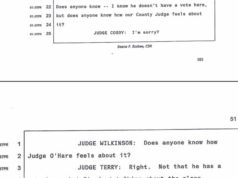A Fort Worth police officer was called into the office of Tarrant County Medical Examiner Nizam Peerwani on Tuesday to discuss what happened on April 18 when Michael Patrick Jacobs died shortly after having been hit with a blast from a Taser.
Jacobs’ parents had called the police to notify them that their son, who suffered from schizophrenia and bipolar disorder, was causing a disturbance. Nearly four months later, Peerwani still has not determined a cause of death, leading the family and their supporters to fear that something’s being covered up.
According to longtime assistant Linda Anderson, Peerwani is hopeful that the interview will provide the last piece in the puzzle he needs to render a determination. The interview, she said, is not an inquest and not open to the public.
The whole idea of a private little tête-à-tête between a county official and a police officer, as opposed to a public inquest, struck Static as troublesome. In most places, inquests held by justices of the peace or medical examiners are public.
However, it’s evidently just business as usual in the Fort. Anderson said that Peerwani frequently interviews witnesses, either by request or subpoena, “when he needs information [about a death] he either doesn’t have or isn’t clear about.”
 She didn’t know exactly what Peerwani would ask the officer, Anderson said, but was “sure it’s related to the Taser use.”
She didn’t know exactly what Peerwani would ask the officer, Anderson said, but was “sure it’s related to the Taser use.”
Marvin Collins, an assistant district attorney with the Tarrant County D.A.’s office, explained that Peerwani is under no obligation to make such interviews public. “This is not a formal inquest. He [Peerwani] has the power in his role as M.E. to conduct that inquiry in any fashion he thinks appropriate, up to and including a formal inquest.” Collins said that the statute covering inquests allows medical examiners to hold “public or private inquests” and that, in a county as large as Tarrant, it would be nearly impossible to alert the public every time Peerwani wanted to interview someone in connection with a death.
Still, people like defense attorney Mark Haney think those sessions ought to be public. “I think we ought to know what’s being asked, what’s covered in those interviews or inquests,” he said. Haney has been involved in two Fort Worth cases in which people died shortly after being tasered repeatedly by police, including the 2005 case of Eric Hammock, who was tasered 25 times.
The Rev. Kyev Tatum, president of the Fort Worth chapter of the Southern Christian Leadership Conference, is one of those who think private interviews signal a possible cover-up. “We think this whole thing, the delay in determining a cause of death, not releasing the names of the officers involved, this private interview, is a cover-up of the use of excessive force by the FWPD. You subvert the justice system when you allow someone appointed by the commissioner’s court to have the right to subpoena people and take information under oath without making it public,” he said.











